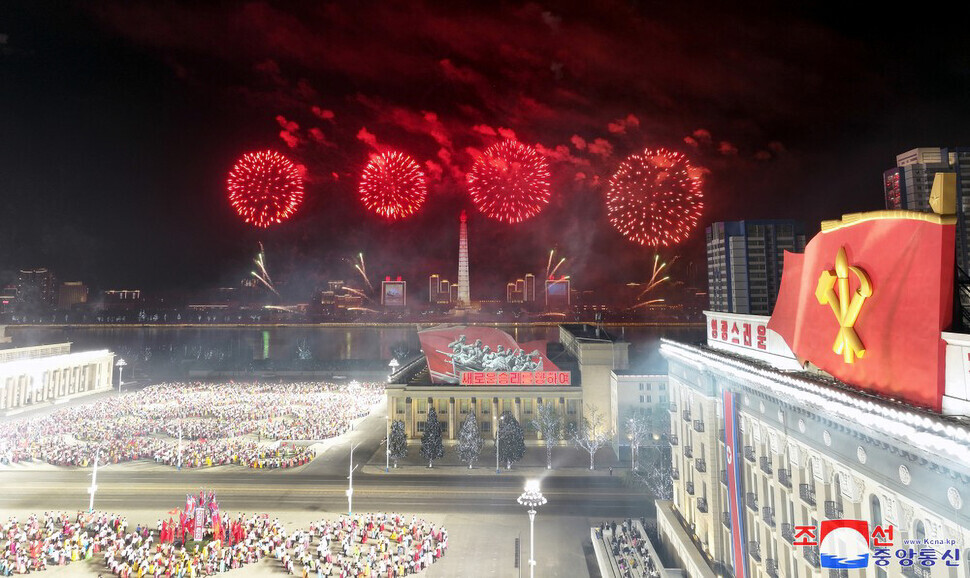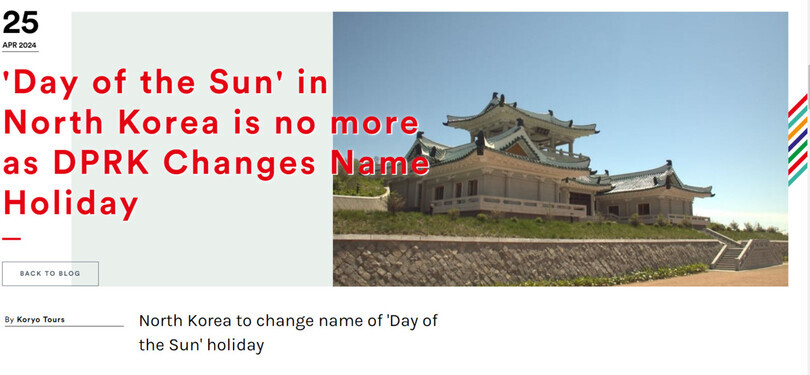hankyoreh
Links to other country sites 다른 나라 사이트 링크
Why Kim Jong-un is scrapping the term ‘Day of the Sun’ and toning down fanfare for predecessors

The anniversary of the birth of Kim Il-sung, the founder of North Korea and grandfather of current leader Kim Jong-un, has historically been North Korea’s most important public holiday. However, this year’s celebration on April 15 seems to have taken place without referring to the holiday by its traditional name, the “Day of the Sun.” Reports have since surfaced that Pyongyang has scrapped the name.
Koryo Tours, a travel agency based in Beijing that specializes in tourism to North Korea, posted on its website on Thursday that it was “informed by [its] North Korean partners that the phrase 'Day of the Sun' is being phased out in North Korea. It will no longer be used.”
“This has not been announced by state media in the DPRK. However, such gradual elimination of phrases is generally not announced. Rather, they are simply just phased out,” the tour company added.
“Nevertheless, without any official announcement, we have been reassured multiple times by our North Korean partners that this phase is indeed to be no longer used. We will be reflecting this change throughout our website.”

North Korea officially designated April 15 as the Day of the Sun in 1997, and has since celebrated the holiday with various state-sponsored events.
“The revolutionary life and achievements of President Kim Il Sung shall be exalted along with the eternal history of Juche Korea. 1. The Juche calendar shall be instituted with 1912, when President Kim Il Sung was born as the sun of Juche, as the first year. 2. His birthday April 15, the greatest national holiday, shall be defined as the Day of the Sun,” read an announcement published on July 9, 1997, by the Korea Central News Agency regarding a resolution “on exalting President Kim Il Sung’s revolutionary life and immortal exploits for all ages” adopted on July 8 of that year by the Workers' Party of Korea Central Committee and Central Military Commission and the National Defence Commission, Central People's Committee and Administration Council.
This year, however, North Korea’s state-run media have not used the designation “Day of the Sun” since Feb. 17. On April 15, the term was used only once in a single article. Observers view this as a deliberate signal that the designation will be retired and replaced.
On April 16, the South Korean Ministry of Unification announced, “In light of the various developments surrounding this year’s celebration of Kim Il-sung’s birthday, we have reached the tentative conclusion that the holiday’s official designation has been changed.”
The Unification Ministry commented that simply using the designation “April 15” as opposed to the “Day of the Sun” was unprecedented.
“To reach a definitive conclusion,” the Unification Ministry continued, “we must observe how North Korea approaches next year’s celebration of the ‘Day of the Shining Star,’” referring to the anniversary of the birth of Kim Jong-il on Feb. 16.
Some observers view the move as the Kim Jong-un regime removing any acts of idolatry that do not directly worship Kim Jong-un.
Another viewpoint is that Kim Jong-un has been forced to consider alternative paths forward since the failure of the February 2019 US-North Korea summit in Hanoi. He is therefore doing away with Pyongyang’s historical practices of idolatry and mythologization concerning the state’s founder.
“North Korean leader Kim Jong-un has been searching for a new political path forward since the failure of the Hanoi US-North Korea summit,” Kim Chang-soo, the head researcher at the Korea National Strategy Institute, wrote in a column for the weekly Sisain (April 30 edition). “This new way forward has involved upgrading the military, emphasizing a public rhetoric that prioritizes the North Korean masses, and attempts to craft a public image of relatability with the common man.”
In short, phasing out terms like “Day of the Sun” is part of a larger campaign to bring the image of North Korea’s leader closer to the people.
“It’s difficult to see the change as Kim Jong-un attempting to raise himself above his grandfather and father,” Kim added.
“It’s impossible for Kim Jong-un to operate outside the foundational philosophy of the North Korean regime, which gives credit to Kim Il-sung for founding the socialist republic,” Kim emphasized. Kim thinks the change is more likely an adjustment to tone down the regime’s practices of idolatry amid the political shifts that followed the Hanoi summit.
“He is basically building a new app in North Korea’s brand of socialism,” Kim concluded.
By Park Min-hee, senior staff writer
Please direct questions or comments to [english@hani.co.kr]

Editorial・opinion
![[Column] Welcome to the president’s pity party [Column] Welcome to the president’s pity party](https://flexible.img.hani.co.kr/flexible/normal/500/300/imgdb/original/2024/0515/3917157400447943.jpg) [Column] Welcome to the president’s pity party
[Column] Welcome to the president’s pity party![[Editorial] Korea must respond firmly to Japan’s attempt to usurp Line [Editorial] Korea must respond firmly to Japan’s attempt to usurp Line](https://flexible.img.hani.co.kr/flexible/normal/500/300/imgdb/original/2024/0514/2317156736305813.jpg) [Editorial] Korea must respond firmly to Japan’s attempt to usurp Line
[Editorial] Korea must respond firmly to Japan’s attempt to usurp Line- [Editorial] Transfers of prosecutors investigating Korea’s first lady send chilling message
- [Column] Will Seoul’s ties with Moscow really recover on their own?
- [Column] Samsung’s ‘lost decade’ and Lee Jae-yong’s mismatched chopsticks
- [Correspondent’s column] The real reason the US is worried about Chinese ‘overcapacity’
- [Editorial] Yoon’s gesture at communication only highlights his reluctance to change
- [Editorial] Perilous stakes of Trump’s rhetoric around US troop pullout from Korea
- [Guest essay] Preventing Korean Peninsula from becoming front line of new cold war
- [Column] The state is back — but is it in business?
Most viewed articles
- 1[Column] Welcome to the president’s pity party
- 2[Editorial] Korea must respond firmly to Japan’s attempt to usurp Line
- 3Korea cedes No. 1 spot in overall shipbuilding competitiveness to China
- 4Could Korea’s Naver lose control of Line to Japan?
- 5[Editorial] Transfers of prosecutors investigating Korea’s first lady send chilling message
- 6[Column] Will Seoul’s ties with Moscow really recover on their own?
- 7US has always pulled troops from Korea unilaterally — is Yoon prepared for it to happen again?
- 8Second suspect nabbed for gruesome murder of Korean in Thailand, 1 remains at large
- 9Korean auto industry on edge after US hints at ban on Chinese tech in connected cars
- 10Major personnel shuffle reassigns prosecutors leading investigations into Korea’s first lady